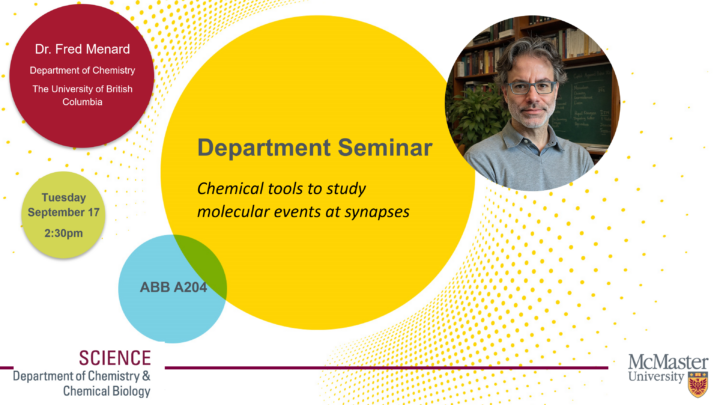Department Seminar: Dr. Fred Menard
Sep 17, 2024
2:30PM to 3:30PM

Date/Time
Date(s) - 17/09/2024
2:30 pm - 3:30 pm
Title: Chemical tools to study molecular events at synapses
Date: Tuesday September 17, 2024
Time: 2:30-3:30pm
Room: ABB A204
Host: Dr. Anthony Rullo
Abstract:
Our lab develops chemical tools to study proteins dynamics in living cells without genetic modifications—with a stong focus on neuron-glia interactions. In the brain, synaptic connections are the foundation of a healthy neuronal network. Uncontrolled loss of these connections can lead to neurological diseases like Alzheimer and Parkinson. The phenotypes are well studied, but the molecular processes that dictate whether a synapse will get strengthened or destroyed are still not understood. Membrane proteins involved in cellular communication control the fate of a synapse and must be studied in living cells to gain meaningful insight. Chemical approaches offer alternative solutions to current genetic methods.
This talk will highlight how small molecules can be modified to monitor, tag, or control proteins involved in critical neurobiological processes. They include membrane proteins such as: glutamate receptors, voltage-gated calcium channels, integrins, and neurexin. We have created a number of molecular probes that can be used as functional reporters or as activity-triggers of cellular activity. Together, these small molecules help us gain unprecedented insight in the function of native proteins in cells like neurons.
Biography:
Fred Menard joined the Chemistry faculty at UBC’s new campus in the Okanagan in 2013. His research group creates new chemical and biochemical strategies to study proteins in living cells. The central question: “How (and why) do astrocytes interact with neurons in the brain?” motivates the research problems under investigation in the group.
Prior to UBC, Fred was a NSERC postdoctoral fellow at Stanford University in J. Du Bois’s research group. During his postdoc, he investigated the molecular mechanisms that govern the function of voltage-gated Na+ ion channels using interdisciplinary approaches including chemical synthesis, molecular biology, and electrophysiology.
Fred obtained his PhD from the University of Toronto, under the direction of Mark Lautens where he developed enantioselective transition-metal catalysis reactions. He completed a BSc and a MSc in organic synthesis at Université de Sherbrooke with Profs. Deslongchamps and Guillaume Bélanger. In addition to academic research, Fred spent Co-op research internships at MDS Pharma in Montreal, then at the Eisai Research Institute in Boston. Before joiing graduate school, he also worked in process chemistry at Pfizer Global R&D in Groton, CT.
Research efforts in the Menard lab have been supported by NSERC, CFI, the New Frontiers Research Fund, the Weston Brain Institute, and the UBC Eminence Fund. He curently co-leads the foundational cluster of research groups for the new Center for Integrated Bioscience focusing on immune diseases at UBCO in Kelowna.
